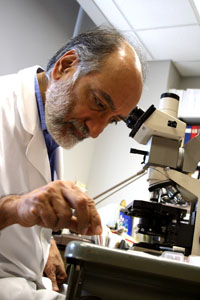Researchers Identify ALS Gene Mutation;
Early Study Is Key to Latest Discovery
 |
| Dr. Teepu Siddique |
Research that has discovered a new gene whose mutations cause 5 percent of inherited cases of ALS (amyotrophic lateral sclerosis) is part of a national study led by the Northwestern University Feinberg School of Medicine.
The study reported in Science today (Feb. 27) points to a common cellular deficiency in the fatal neurological disorder, said Teepu Siddique, MD, Les Turner ALS Foundation/Herbert C. Wenske Foundation Professor in the Davee Department of Neurology and Clinical Neurological Sciences and Department of Cell and Molecular Biology and director of the Division of Neuromuscular Medicine at the Feinberg School.
The new research is part of a national collaboration directed by Dr. Siddique, the principal investigator for the “Genetics of ALS” project funded at Feinberg by the National Institutes of Health.
Earlier research by Siddique and colleagues extended the genetic knowledge of familial (inherited) ALS by identifying the first and second ALS genes (the SOD1 gene in 1993 and the ALSIN gene in 2001), in addition to identifying loci on chromosomes 9, 15, 16, and X.
The study published today discovered aFUS/TLS gene mutations in ALS families collected through efforts of the NIH-funded multi-center project and included among others a large Italian family previously studied by Drs. Siddique and Cortelli.
ALS affects the motor neurons in the central nervous system. As motor neurons die, the brain’s ability to send signals to the body’s muscles is compromised. This leads to loss of voluntary muscle movement, paralysis, and eventually death from respiratory failure. The cause of most cases of ALS is not known.
“The purpose of this national study is to understand what triggers the death of motor neurons in order to find new cellular models of ALS, with the ultimate goal of advancing research that leads to a treatment for this fatal disease,” Dr. Siddique said. “Approximately 10 percent of ALS cases are inherited.”
“The discovery of this gene mutation shows new kinds of molecular defects that damage motor neurons and it implicates defective pathways previously identified in other genetic forms of ALS,” said Dr. Siddique.
The new findings were reported in Science by the University of Massachusetts Medical School, one of three institutions that collaborate with Dr. Siddique on the national study. Other authors from the consortium include M.A. Pericak-Vance (University of Miami) and Jonathan Haines (Vanderbilt University). Robert H. Brown Jr., MD, chair and professor of neurology at University of Massachusetts Medical School, was senior investigator of the study and lead author of the Science paper.
In addition to funding from the NIH, Siddique’s ALS research is supported by the Les Turner ALS Foundation, Vena E. Schaff ALS Research Fund, Harold Post Research Professorship, Herbert and Florence C. Wenske Foundation, Ralph and Marian Falk Medical Research Trust, The David C. Asselin MD Memorial Fund, Les Turner ALS Foundation/Herbert C. Wenske Foundation Professorship, Help America Foundation, and the ALS Therapy Alliance, Inc.






